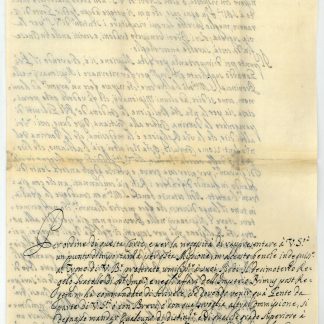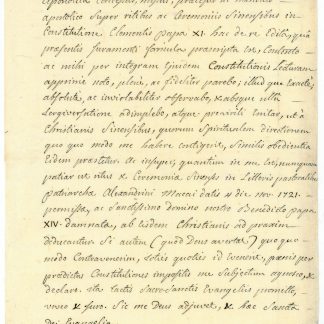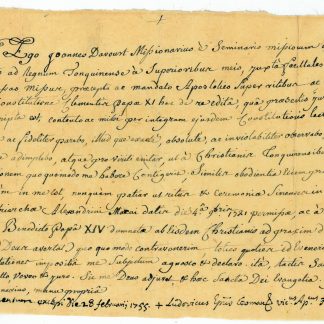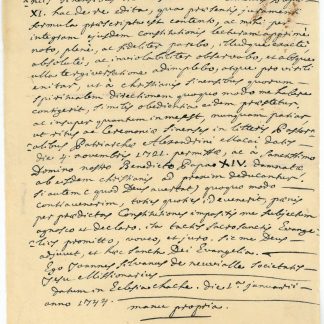A leading French Jesuit missionary in China who died as a Portuguese prisoner
Autograph document signed.
8vo. 1 p. In Latin.
€ 3.000,00
An oath renouncing the practice of the Chinese rites, taken by the Jesuit missionary as required by the Papal Bull "Ex Quo Singulari" (1742). The oath was sworn on the Bible, and a signed autograph ("manu propria") of the formula had to be produced as evidence.
Born in Angoulême, Jean-Sylvain de Neuvialle entered the noviciate of the Jesuits in 1711 and was sent to Macau in 1729. Little is known of his initial missionary work, but from 1740 he was active in the mountainous regions of the historical Huguang province. The document at hand dates from this period, and Neuvialle took the oath in a church ("in ecclesia") probably built by him and his followers, in an unidentfied location that is transcribed as Chache. Despite its remoteness and inaccessability, the persecutions of missionaries and converts eventually reached the region, and Neuvialle was forced to return to Macau in 1747. From there he served twice (1747-52 and 1758-62) as superior of the French Jesuit China mission and authored a report on the diplomatic mission of Francisco Xavier Assis Pacheco e Sampaio Melo, the Portuguese ambassador in Siam, for the Imperial Court in Beijing, published in 1754.
On 5 July 1762, the remaining 24 Jesuits in Macau, including the three French missionaries Neuvialle, Gabriel Boussel and Louis-Marie Dugad, were arrested at St. Paul's College by emissaries of the Marquis de Pombal, who proceeded to sequester the estate of the Jesuits following the 1759 suppression of the Jesuits in the Portuguese Empire. A protest note pointing to the independence of the French mission from the Jesuit province of Japan and vice-province of China and demanding their release had no effect, and the prisoners were subsequently sent to Goa, where they arrived in March 1763. After 11 months' imprisonment at Fort Mormugão they embarked again, this time for Bahia, Brazil, but both Jean-Sylvain de Neuvialle and Gabriel Boussel died at sea in 1764. - During the early years of their mission to East Asia, the Jesuits led by Matteo Ricci accommodated Catholicism to Chinese customs and Confucian practice in important ways, both for political reasons and in the hope of attracting more converts. Criticism of this syncretism is as old as the Chinese rites themselves, and Ricci's direct successor Niccolò Longobardo attempted to change course, which led to his replacement as provincial. When Dominican and Franciscan missionaries entered China, they reported to Rome critically on the Jesuit practices. A first condemnation was decreed by Pope Clement XI in 1704 and confirmed in the 1715 Bull "Ex Illa Die". In reaction to the condemnation, the Kiangxi Emperor, who initially had tolerated the Christian missionaries and enjoyed especially good relations with the Jesuits, officially forbade Christian missions in China. In 1721, Carlo Ambrosio Mezzabarba, the Latin Patriarch of Alexandria, was sent as a Papal legate to Macau and Beijing. Despite the concession of "eight permissions" regarding the practice of the Chinese rites, officiated in a pastoral letter to the missionaries from 4 November 1721, the Emperor did not revoke the ban. Finally, in "Ex Quo Singulari", Pope Benedict XIV re-affirmed the Bull of 1715 and required all missionaries in the region to take the oath renouncing the practice of Chinese rites.
A transcription and translation of the document are available on request.
Minimal tears and minor browning.
Louis Pfister, Notices biographiques et bibliographiques sur les jésuites de l'ancienne mission de Chine, 1552-1773, Chang-hai, 1932-1934 (Nendeln: Kraus Reprint, 1971), no. 325, pp. 724-729.






